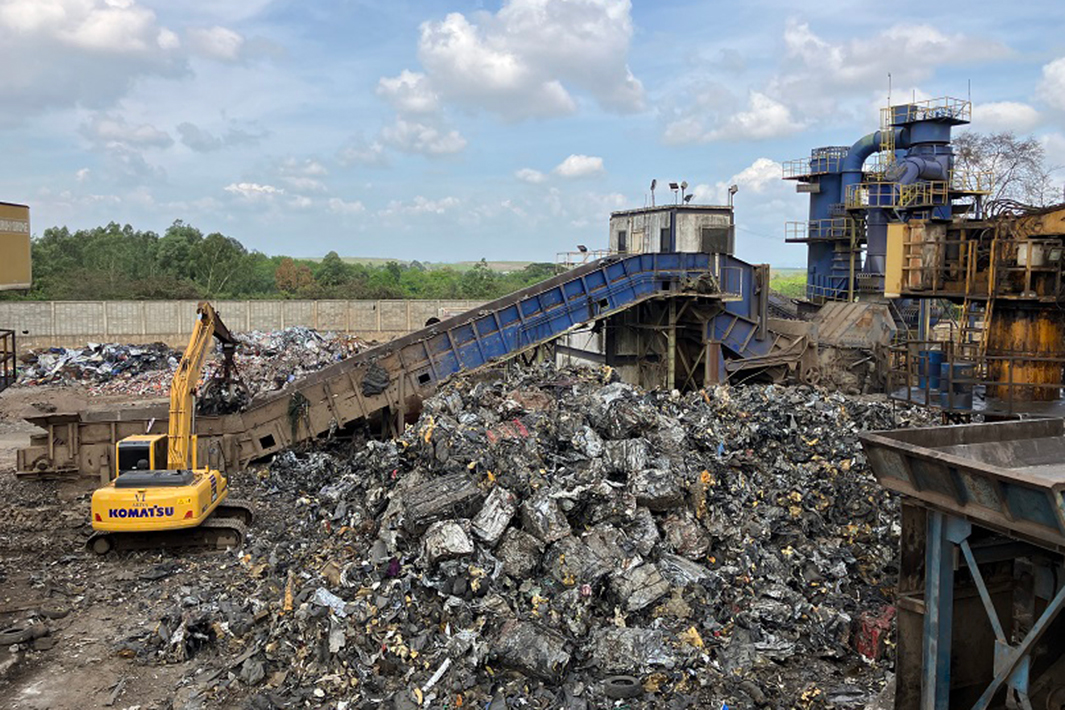
Millcon Steel, a major electric furnace manufacturer in Thailand, supports the country’s economic growth in various fields, including the production of deformed steel bars and round bars through an integrated system from shredding ELVs (end-of-life vehicles) to steelmaking and rolling, as well as collaboration in upstream operations in the wire rod field through Kobelco Millcon Steel, a joint venture with Kobe Steel. I recently visited the company’s Burapa Plant (Rayong Province) and Wastech, a shredder plant.
It is located 200 kilometers southeast of Bangkok and two-and-a-half-hour drive on the expressway through the countryside, past the commuter rush in the city. The company’s building can be seen a little further in from National Highway 36. The company’s site is 222,000 square meters, where the Burapa plant and Wastech are located.
Upon arrival at the site, we received an overview of the business and current status from Millcon Steel CEO Pravit and Wastech COO Suphamongkhon at the office, then boarded a car for a tour and headed into the site.
The first area we toured was the Wastech area, and the first thing that caught our eyes was the vast raw material yard and piles of car presses (known as car bundles). Car bundles are imported mainly from South Korea and Australia and are brought in by unloading containers at Laem Chabang Port, a major trading port in Thailand located 60 kilometers to the west.
In Thailand, cars are mostly exported to Laos and Myanmar as used cars before they are scrapped, and there is no established recycling flow like in Japan. For this reason, there is no market generation of car presses, and the entire amount is covered by imports.
The shredder area is an open yard, with one pre-shredder, one 3000 hp main shredder, and various sorting equipment neatly lined up. Big excavator feed car presses one after another into the pre-shredder, and another excavator carries the loosened material to the main shredder attached to the facility. Combined with the huge site that spreads out in the background of the facility, it is very dynamic.
Silver-colored steel scrap is discharged one after another from the main shredder and piled up. The company has know-how in shredding and sorting, and despite the appearance of the car press, the finished product is very beautiful. The shredder capacity itself is 25,000-30,000 t/month, but the current level is around 10,000 t/month due to sluggish demand for products.
When I visited the main Burapa factory, I saw many tall buildings and an electric furnace in the darkness. Unfortunately, the plant does not operate during the daytime, as electricity in Thailand is said to be the most expensive in Southeast Asia and, like in Japan, is mainly operated at night.
The plant is equipped with a series of facilities, including a 75-ton electric furnace from Danieli of Italy and a 4-strand continuous casting mill, and mainly produces deformed steel bars with a wire diameter of 20 mm or more. The Rama 2 Plant (located in Bangkok) performs single rolling of billets produced at the Burapa Plant and is responsible for the manufacture of products with diameters of 20 mm or less.
Demand for rebar and steel products has been weak recently due to a lull in the construction market and the influx of inexpensive Chinese steel products, and the company is struggling with actual production at 30-40% of its annual production capacity of 800,000 tones. There are less than ten electric furnace makers and six induction furnace makers operating in Thailand, but like our company, their utilization rates are below 50%, and each company is in a difficult situation” (CEO Pravit).
Looking at urban areas in and around Bangkok, cranes for high-rise construction are lined up everywhere, so the construction market does not appear to be in bad shape. But the Chinese economic downturn has led to a slump in investment in condominiums, and the removal of the LTV relaxation measures on mortgage loans has also depressed consumer purchasing power.
On the other hand, under the Thai government’s “Thailand 4.0” initiative for industrial upgrading, foreign direct investment in automobiles, electronics, biotechnology, and other industries has been strong, with investment in 2023 increasing 71% from the previous year on an application basis, and the country’s appeal as a production base in ASEAN remains strong.
In particular, the EV (electric vehicle) market is expected to attract related factories, construct new factories, and raise the demand for housing for workers in the future, as rising Chinese manufacturers will accelerate local production in Thailand starting this year. (write=Eisaku Ishibashi)












